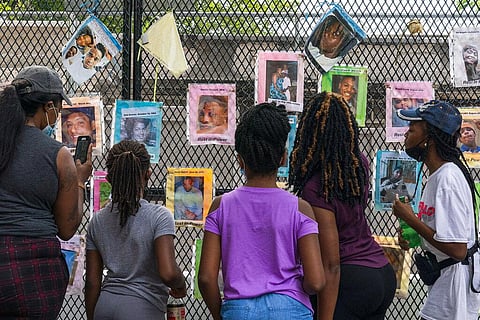

WASHINGTON: The 9-year-old Black girl sat handcuffed in the backseat of a police car, distraught and crying for her father as the white officers grew increasingly impatient while they tried to wrangle her fully into the vehicle.
"This is your last chance," one officer warned.
"Otherwise pepper spray is going in your eyeballs."
Less than 90 seconds later, the girl had been sprayed and was screaming, "Please, wipe my eyes! Wipe my eyes, please!" What started with a report of "family trouble" in Rochester, New York, and ended with police treating a fourth-grader like a crime suspect, has spurred outrage as the latest example of law enforcement mistreatment of Black people.
As the US undergoes a new reckoning on police brutality and racial injustice in the wake of George Floyd's death last May, the girl's treatment illustrates how even young children are not exempt.
Research shows Black children are often viewed as being older than they are, and are more likely to be seen as threatening or dangerous.
Advocates have long said that leads to police treating them in ways they wouldn't dream of treating white children.
In some cases it's led to fatalities like the killing of Tamir Rice, a 12-year-old Black boy shot by a white police officer in Cleveland in 2014.
"Black children have never been given their opportunity to be children," said Kristin Henning, law professor and director of the Juvenile Justice Clinic and Initiative at Georgetown Law.
A study published in the journal Pediatrics in late 2020 found Black children and teens were six times as likely to die from police gunfire as white children.
It analysed data from police use of force in situations involving young people between the ages of 12 and 17 from 2003 to 2018.
"Black children have really been seen as older, more culpable, less amenable to rehabilitation and less worthy of the Western notions of innocence and the Western notions of childhood," Henning said.
The headlines from Rochester were deeply personal for Mando Avery, whose 7-year-old son was hit by pepper spray from a police officer aiming at someone else during a protest in Seattle last summer.
The spray left the boy's face and chest painful and swollen from chemical burns for several days, and even required a visit to the ER.
He's since had nightmares and now fears police.
Small things can bring back bad memories, like using a spray bottle to do the boy's hair.
"Their innocence goes away much, much sooner," he said.
"What kind of temper tantrum leads to handcuffing a child?" In the Rochester case, the girl's mother called police on January 29 after an argument with her spouse, and said she asked officers to call mental health services when her daughter grew increasingly upset.
But police body camera video shows only officers at the scene, first handcuffing the girl's hands behind her back and then growing increasingly impatient as they tried to get her into the police car, culminating in the pepper spray.
There's a point in the video where an officer says, "You're acting like a child!" to which the girl replies, "I am a child!" The officers have been suspended pending an investigation.
More video footage released Thursday showed the wait until an ambulance arrived for the girl.
The case comes months after the high-profile death last spring of Daniel Prude, a Black man undergoing a mental health crisis when his family called the Rochester police.
Officers handcuffed him, then put a hood over his head when he spit at them.
As he struggled, they pinned him face down on the ground, one officer pushing his head to the pavement until he stopped breathing.